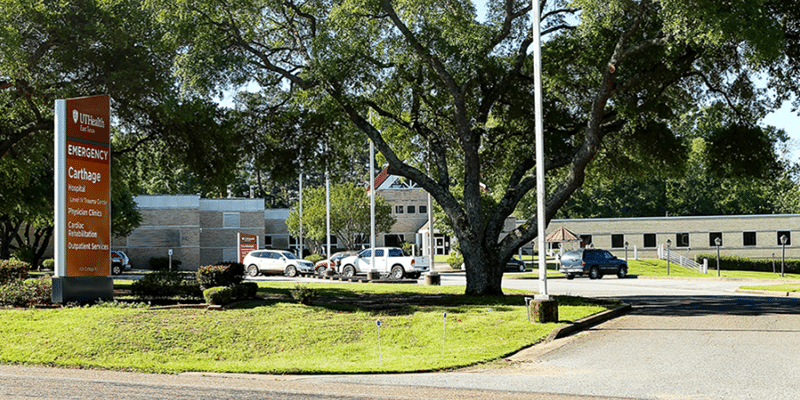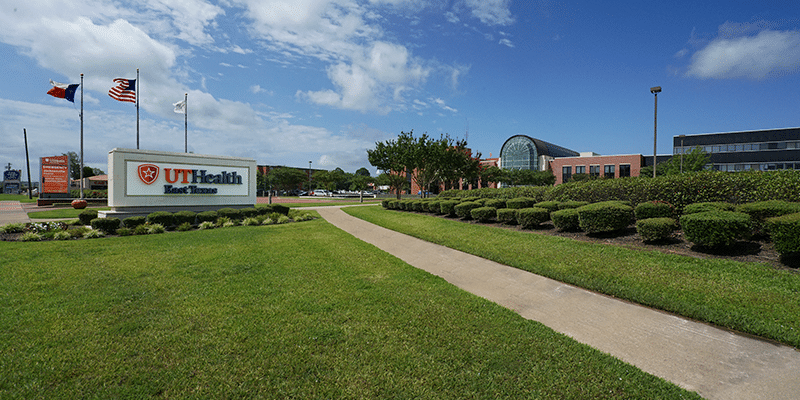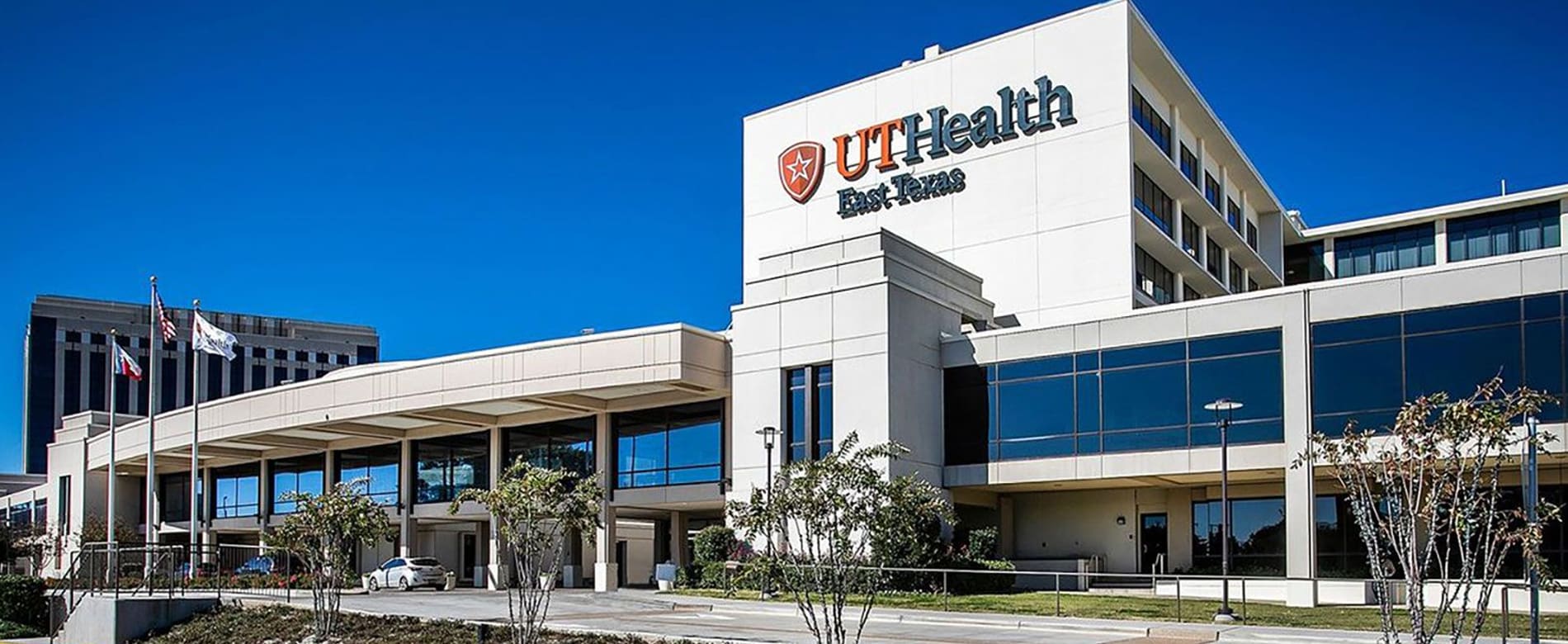Emergency rooms in East Texas
Welcome to UT Health East Texas, your trusted provider for exceptional emergency medical care. Whether you’re facing minor ailments or severe health crises, our emergency rooms (ERs) are fully equipped with the latest technology and staffed by certified emergency physicians and nurses. We offer Level I and Level IV trauma care at various locations across East Texas, as well as comprehensive stroke care and heart attack treatments. No matter your needs, our emergency team will provide rapid care for medical emergencies and 24/7 emergency care you can depend on.

Emergency conditions we treat
UT Health East Texas emergency rooms are fully equipped and prepared to handle a broad range of medical crises, both minor and major. We offer access to a variety of services, including diagnostic testing, intensive care, surgery, and cardiac care.
Our ER team is skilled in addressing various urgent health issues, such as:
- Breathing difficulties: This includes conditions like asthma flare-ups, serious allergic reactions, and cases of pulmonary embolism.
- Burns: Urgent attention is needed for burns that are deep, cover a large area, or affect sensitive regions like the face, hands, feet, or genitals.
- Dehydration or heat stroke: Indicators of heat stroke include excessive thirst, no urine output, or changes in mental state.
- Fractures and major sprains: These conditions are especially concerning if there’s noticeable distortion, intense pain, numbness, or loss of function in the affected area.
- Heart attack symptoms: This includes chest discomfort, difficulty breathing, and pain in other upper body areas. Learn more about our heart health services.
- High fever: High fevers are particularly critical in babies, young children, the elderly, or those with compromised immune systems.
- Intense headaches/migraines: If your headache starts suddenly, is extremely painful, or comes with symptoms like vision changes or neck stiffness, visit an ER.
- Mental health crises: This includes thoughts or acts of suicide or harming others, extreme panic attacks, or episodes of psychosis. Learn more about our behavioral health care services.
- Obstetric complications: This can include significant bleeding during pregnancy, intense abdominal pain, or indications of early labor.
- Poisoning or overdose: This may involve the accidental intake of harmful substances or misuse of medications, whether prescription or over-the-counter.
- Seizures: Especially if it’s a first occurrence, or the seizures are frequent or prolonged, patients should visit an ER.
- Severe abdominal pain: This includes pain that could signal conditions like appendicitis, abdominal aneurysms, or other critical issues.
- Serious infections: Examples include sepsis, severe pneumonia, and critical urinary tract infections.
- Stroke symptoms: This includes sudden weakness or numbness in part of the body, confusion, speech difficulties, vision issues, or loss of balance or coordination. Learn more about our neurological treatments.
- Sudden vision changes: This includes sudden blindness or blurred vision, which can be a sign of stroke or another life-threatening condition.
- Trauma or severe injuries: Injuries resulting from car accidents, falls, or major head trauma should be addressed at an ER.
- Uncontrolled bleeding: This includes situations where bleeding persists despite 10 minutes of direct pressure.
If you or someone you know is experiencing any of these symptoms or conditions, please dial 911 immediately.
Level I Trauma Center at UT Health Tyler
UT Health Tyler is home to the region’s only Level I Trauma Center, as designated by the Texas Department of State Health Services. That means we have the resources and staff to respond to diverse medical needs, such as mass casualty and trauma events, severe burns, head injuries, heart attacks, and strokes. Studies show that receiving treatment at a Level 1 trauma center increases a seriously injured patient’s chances of survival by an estimated 20 to 25 percent.
Learn more about the Level I Trauma Center at UT Health Tyler.
Level IV Trauma Center locations
Being certified by the state of Texas as a Level IV trauma center proves our ability to deliver advanced trauma life support (ATLS). This includes rapid evaluation, stabilization and diagnostic capabilities for sick and injured patients, along with the ability to stabilize and transfer to a higher level of trauma care, if necessary.
We offer Level IV trauma support at the following locations:
- UT Health Athens
- UT Health Carthage
- UT Health Henderson
- UT Health Jacksonville
- UT Health North Campus Tyler
- UT Health Pittsburg
- UT Health Quitman
For a higher level of trauma support, visit our Level I Trauma Center at UT Health Tyler.
Level III Stroke Centers
UT Health East Texas offers three Level III Stroke Centers across East Texas. Our Level III stroke centers are equipped to administer initial emergency care and stabilization for stroke patients. We also have the capability to perform basic diagnostics and provide initial treatments.
Level III stroke care is offered at the following locations:
- UT Health Henderson
- UT Health Pittsburg
- UT Health Quitman
We also offer Level IV stroke support at UT Health Athens and a Comprehensive Stroke Center at UT Health Tyler Neurological Institute.
Level IV stroke support
UT Health Athens has been designated as a Level IV support stroke facility (SSF) by the state of Texas. This means our emergency center has met all guidelines for providing resuscitation, stabilization, assessment and treatment. We also have the ability to transfer patients to the UT Health Tyler Comprehensive Stroke Center if necessary.
A Level IV Support Stroke Facility has 24/7 access to emergency center doctors and nurses with specialized, ongoing stroke training, diagnostic CT scans, lab technician and services.
What to expect at our ER
Upon arrival, each patient undergoes a process called triage. This process, conducted by our triage nurses at the front desk, categorizes patients based on the severity of their conditions into immediately life-threatening, urgent but not life-threatening, and less urgent.
Our ER wait times typically fall below the national average, but it’s important to understand that these times can vary greatly depending on what’s happening at our ER that day. Our primary focus in the ER is to save lives, so if a patient with a life-threatening condition arrives, they may be prioritized. This approach is different from that of urgent care or standard medical appointments, as our ER operates on a need-based system rather than a first-come-first-serve basis.
After triage, the check-in process includes an assessment of your vital signs. Then an emergency medicine physician will delve deeper into your condition. This stage often involves coordinating with multiple specialists, such as radiologists, general surgeons, neurologists, gastroenterologists, and others who contribute remotely by analyzing diagnostic reports and advising our emergency team.
In terms of treatment outcomes, you may be admitted for further care, discharged with instructions, referred to a primary care physician, or transferred to another facility. Our ER focuses on treating emergent, urgent, and traumatic conditions and does not typically prescribe narcotics for chronic issues.
When to go to the ER
Below are symptoms of life-threatening or critical emergencies that indicate an ER visit is necessary:
- Chest pain or pressure
- Coughing or vomiting blood
- Difficulty breathing or shortness of breath
- Heart attack
- Heavy or uncontrollable bleeding
- Seizures
- Sudden confusion
- Sudden or excessive pain
- Sudden vision changes
- Suicidal thoughts
- Unconsciousness
- Upper abdominal pain or pressure
If you are experiencing any of these symptoms, call 911.
EMS and AIR 1 emergency transportation services
Since 1985, the professionals of the UT Health East Texas AIR 1 program have answered the call to care for the most critical medical cases across East Texas. AIR 1 provides emergency helicopters and staff to deliver rapid response to assist in everything from major trauma calls, such as car accidents, cardiac and stroke patients or the stabilization and transport of adult, pediatric, newborn, and high-risk patients.
Each ambulance and emergency helicopter features Pulsara, an advanced mobile communication technology to track heart and stroke patients in real time before, during and after arrival at the emergency room. Every second saved during an emergency improves the likelihood of a life saved.
With more than 65 ambulances, including a specially equipped critical care ambulance, three active helicopters and one helicopter in reserve that are strategically located across the region, emergency teams provide rapid access to care. When an emergency happens and every seconds count, the men and women of UT Health East Texas EMS and AIR 1 are ready to answer the call.
Accreditation matters
UT Health EMS is the only ground transport service in the region accredited by the Commission on Accreditation of Ambulance Services (CAAS). In addition, UT Health East Texas AIR 1 is accredited by the Commission on Accreditation of Medical Transport Systems (CAMTS). These accreditations mean UT Health EMS and AIR 1 has met or exceeded industry standards for quality, patient care and safety. Also, the UT Health East Texas EMS Dispatch Center is one of only nine centers in Texas to be recognized as an Accredited Center of Excellence (ACE) by the International Academies of Emergency Dispatch.
UT Health East Texas EMS Membership
Only $60/year for your household
Your UT Health East Texas EMS membership protects you from out-of-pocket expenses. It prepays any portion of the ambulance transport charges not covered by insurance or Medicare.
A low annual fee covers you, your spouse and your dependent children living in your residence (those younger than age 21 or 25 if in college) for medically necessary* transports by UT Health East Texas EMS ambulances.
Easy enrollment by phone, online or by mail.
For information regarding the membership program, call 1-800-642-JOIN (5646) to talk to a customer service representative. Customer service representatives are available Mon – Fri, 8 a.m. – 5 p.m.
To enroll online, click here. You’ll be directed to a secure payment platform to complete your enrollment.
To enroll by mail, download the UT Health East Texas EMS enrollment form. Please mail the signed, completed form along with payment to:
UT Health East Texas EMS
P.O. Box 6968
Tyler, TX 75711
The UT Health East Texas EMS membership difference:
- Pays for all medically necessary ambulance transports that is not covered by health insurance.
- 50% coverage of billed emergency transport charges for members without health insurance.
- Large coverage area — all of Henderson and Panola Counties, most of Smith, Cherokee and Wood Counties and the City of Henderson.
- It includes coverage for medically necessary* transports to and from hospitals in Dallas, Fort Worth, Houston and Lufkin.
- Coverage for all qualified members of your household (you, your spouse and your dependent children living in your residence who are younger than age 21 or 25 if in college).
- UT Health East Texas EMS is an accredited ambulance service by the Commission on Accreditation of Ambulance Services.
- Our communication dispatch center is an International Academies of Emergency Dispatch® (IAED™) Accredited Center of Excellence (ACE), one of only eight accredited communication centers in Texas
- For six years, UT Health East Texas EMS has earned the American Heart Association’s Mission: Lifeline EMS Gold Plus Award for implementing quality improvement measures for the treatment of patients who experience severe heart attacks.
Not included is transportation to or from physicians’ offices, pharmacies, physical therapy centers, dentists’ offices or facilities outside the service area. Transports covered include only those conducted by UT Health East Texas EMS. This is not insurance or a supplement.
Peace of mind if you need emergency ground transport
Medical emergencies are stressful and bring unplanned expenses. But UT Health East Texas EMS membership gives you peace of mind: In a time of crisis, you won’t have the added worry of another big bill.
All it takes is a low annual fee – now payable online, so your protection begins at once – and you may pay by check, money order or credit card.
In many cities, an installment plan is available, in which the fee is paid through monthly water bills. If you pay in this manner, please note that you are making a one-year commitment and the fee must be paid each month for your membership to be valid.
Once you sign up, you’re enrolled electronically. There’s no card to carry or show when you need UT Health East Texas EMS services. Another convenience of UT Health East Texas EMS!
—
* “Medically necessary” is defined as specific need of ambulance transportation to or from a healthcare facility (hospital, nursing home) within the UT Health East Texas EMS primary service area where use of alternative forms of transportation (wheelchair transports, private car, taxi) would be medically inappropriate given the patient’s condition. UT Health East Texas EMS reserves the right to require physician certification of medical necessity for all non-emergencies. If abuse is found to exist, UT Health East Texas EMS reserves the right to terminate membership.
* By my application and payment of the annual fee, I represent that I am not enrolled in Medicaid or any Medicaid health plan. If my Medicaid status changes, I agree to notify UTHEMS in writing. No Medicaid enrollee will be charged for the annual UTH EMS annual fee and any amount paid prior to enrollment will be prorated and returned to the member.
UT Health EMS/AIR1 contact info
903-535-5800
352 S. Glenwood
Tyler, TX 75702
Learn More About Emergency Care at These UT Health Hospitals

UT Health Athens
Learn More
UT Health Carthage
Learn More
UT Health Jacksonville
Learn More
UT Health North Campus Tyler
Learn More
UT Health Pittsburg
Learn More
UT Health Tyler
Learn More